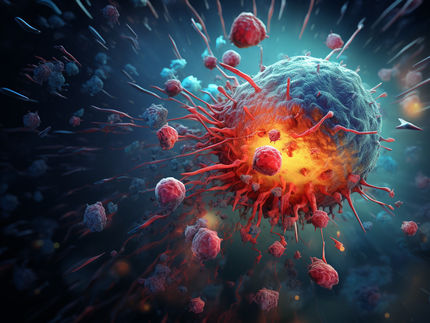Affimed enrolls first patients in Phase I Hodgkin's Lymphoma Study
Advertisement
Affimed Therapeutics AG announced that the first patients with Hodgkin's Lymphoma have been treated with the AFM13 TandAb® antibody in a Phase I clinical study. The Phase I repeat dose escalation study will enroll approximately 40 Hodgkin's Lymphoma patients across two centers in Europe and the US. The first patients have now been treated with Affimed's lead product AFM13 and will receive a total of four doses in weekly intervals. In the initial dosing the antibody was well tolerated. Results from the trial will become available on a patient by patient basis and complete data are expected by Q4 2011.
AFM13 is a tetravalent, bispecific antibody based on Affimed's proprietary RECRUIT-TandAb® technology. It binds the CD30 target molecule on the surface of Reed- Sternberg tumor cells and simultaneously activates natural killer cells (NK cells). Preclinical data suggests that RECRUIT-TandAbs® are able to identify and selectively destroy tumor cells in the human body. AFM13 has been granted Orphan Drug designation in Europe and the US.
The European and US Phase I study will primarily assess safety, tolerability and the pharmacokinetics of AFM13 plus first indications of biologic activity. Principal investigator in Europe is Prof. Dr. Andreas Engert, Chairman of the German Hodgkin Study Group and professor of internal medicine, hematology, and oncology at The University Hospital of Cologne. Principal investigator in the US is Professor Dr. Anas Younes (Director, Clinical and Translational Research Program, Department of Lymphoma/ Myeloma, Division of Cancer Medicine, M. D. Anderson Cancer Center, Houston).
"With the first TandAb® antibody entering the clinic Affimed has achieved a very important milestone towards the clinical validation of our TandAb® platform", said Dr. Rolf Günther, CEO of Affimed. "We are very happy that both FDA and the Paul-Ehrlich-Institute supported our IND and CTA application and look forward to advancing the treatment of Hodgkin's Lymphoma and other cancers by exploiting the unique advantages of our technology."
Professor Dr. Melvyn Little, CSO of Affimed added: "The application of tetravalent, bispecific antibodies to treat cancer is a first in humans and has the potential to create new and exciting treatment options for a wide range of diseases. TandAbs® are expected to have major advantages over first generation antibodies. Advanced Hodgkin's Lymphoma is a severe disease and there are only few treatment options available or in development."
Other news from the department research and development
Most read news
More news from our other portals
See the theme worlds for related content
Topic world Antibodies
Antibodies are specialized molecules of our immune system that can specifically recognize and neutralize pathogens or foreign substances. Antibody research in biotech and pharma has recognized this natural defense potential and is working intensively to make it therapeutically useful. From monoclonal antibodies used against cancer or autoimmune diseases to antibody-drug conjugates that specifically transport drugs to disease cells - the possibilities are enormous

Topic world Antibodies
Antibodies are specialized molecules of our immune system that can specifically recognize and neutralize pathogens or foreign substances. Antibody research in biotech and pharma has recognized this natural defense potential and is working intensively to make it therapeutically useful. From monoclonal antibodies used against cancer or autoimmune diseases to antibody-drug conjugates that specifically transport drugs to disease cells - the possibilities are enormous



























































